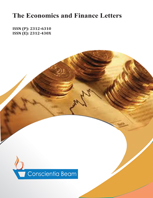Economic and Noneconomic Forces on Remittance Receiving: A Panel Analysis of Top Remittance Sending Countries towards Bangladesh
DOI:
https://doi.org/10.18488/journal.29.2021.82.201.212Abstract
The purpose of the paper is to investigate the impacts of economic and non-economic factors on the remittance receiving of Bangladesh. The study focuses on quantitative analysis of unbalanced panel data of 8 countries on remittance receiving of Bangladesh for the period of 1981-2019 by employing fixed effects model and random effects model. The results show that crude oil price, domestic credit to private sector of host country, and global financial crisis of 2008-10 have significant positive impact on remittance receiving of Bangladesh. GDP per capita of home country has significant negative impact which is an evidence of altruistic motive of migrant workers to remit more money. The impact of terrorist attacks on September 11, 2001 is found significantly positive as it resulted into strict change in monetary regulation by spreading more money from informal channel to formal channel. The political unrest in Bangladesh during 2007-08 has insignificant positive impact what means the non-democratic and army backed 1/11 government did not help to grow the remittance receiving. Inflation rate of host country has insignificant positive impact and FDI to GDP of host country has insignificant negative impact.

